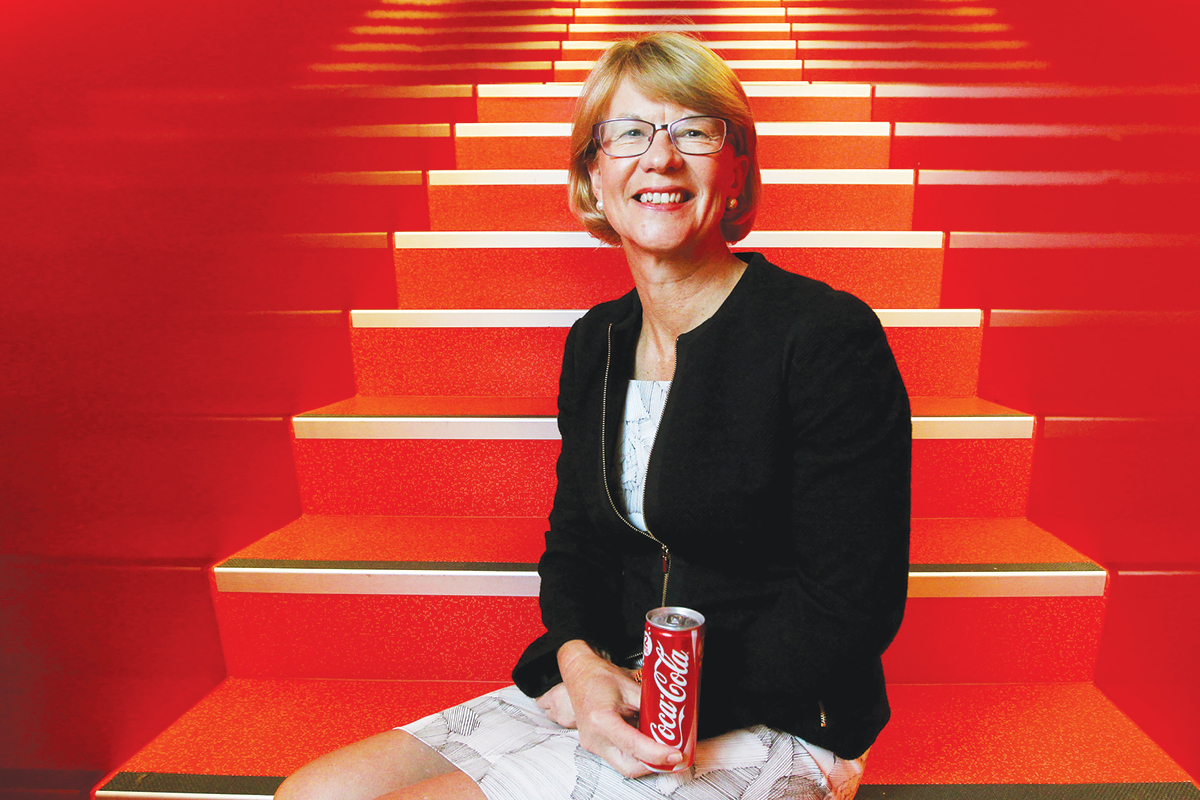Alison Watkins was so ready to take on 2020. The Group Managing Director of Coca-Cola Amatil (CCA) was looking forward to signing off on some pretty big decisions, while driving existing strategies even further to ensure the company remains one of the largest bottlers and distributors of beverages throughout the Asia–Pacific region.

After more than six years in the job, working closely with the company’s major shareholder Coca-Cola, Alison was relishing the task ahead of her, which included expanding the company’s environmental sustainability commitments.
The to-do list ahead saw 100% recycled plastic bottles; working with and investing in startups to build entrepreneurial capability; having a third of board, senior executive and management positions occupied by women; and continuing the fight against obesity with smaller packaging, reduced sugar content and clearly labelled ingredients and calories.
Sustainability was paramount and goals for 2020 included the company’s commitment to improving water intensity for non-alcoholic beverages to no more than 1.95L/L and improving water intensity for alcoholic beverages by 25%; delivering a 25% carbon reduction for the ‘drink in your hand’; ensuring that 60% of energy requirements come from renewable and low-carbon sources; developing a business case for 50% recycled plastic in PET containers in Australia; and ensuring 80% of spend with suppliers is covered by responsible sourcing assessments.
CCA was right on track to achieve them. But then along came COVID-19. Even with Alison’s extraordinary track record in the corporate world, including her roles as Chair of Allied Mills Australia, Managing Director and CEO of GrainCorp and CEO of Berri Limited, nothing could have prepared her for the challenges of COVID-19, particularly when they arrived hot on the heels of Australia’s devastating bushfires, which had already flattened CCA revenues.
Yet, in her cool, calm and collected style and exerting the professionalism for which this dynamic leader is renowned, Alison steadily moved forward, making vital decisions, not only for CCA, but for businesses spanning Australia.
Entering the crisis with good momentum, having enjoyed a A$700 million operating cash flow for the past two years and a high level of capital spend and dividend payout, CCA responded quickly to ensure its survival.
With the virus decimating sales of beverages at cafes, restaurants, bars, sports stadiums and fast-food chains, Alison cut the company’s dividend to preserve cash and slashed costs by A$140 million, implementing significant reductions in incentives, freezing recruitment, reducing marketing expenditure, minimising discretionary spend and cutting expenditure on non-critical projects from A$300 million to A$200 million.
Strategies to protect the company’s 12,000 workers and their jobs were also implemented quickly. Shifts at bottling plants were separated and handed over virtually; field teams stocked grocery stores during non-peak periods; a leave management strategy redeployed staff across sales channels; and free 24-hour customer support and counselling services were offered to customers struggling with the impact of the virus.
Sharing its brand with The Coca-Cola Company, CCA is one of the world’s larger bottlers of the beverage giant’s enormous range of products. The company operates 32 production and 43 warehouse facilities in Australia, New Zealand, Indonesia, Papua New Guinea, Fiji and Samoa.
Its huge portfolio of products boasts 160 brands of water, kombucha, sports and energy drinks, fruit juice, iced tea, flavoured milk, coffee, tea, beer, cider and spirits.
Brands including Fanta, Kirks, Mount Franklin, Mother, Midori, Galliano and Canadian Club are estimated to reach more than 270 million potential consumers through more than 950,000 active customers.
However, product popularity aside, there is a lot going on behind the scenes of those iconic labels, as CCA continues to build an outstanding reputation for its contribution to communities, the protection of the environment and the wellbeing of its workers.

The company’s contribution to rescue services and victims of Australia’s bushfires is just one example. While, to some, it might seem like a lifetime ago since fires roared through bushland in New South Wales, South Australia and Victoria late last year and early this year, with their destructive paths still impacting just weeks before COVID-19 entered the fray, CCA was stepping up to assist.
The company donated 250,000 bottles of water and Powerade to bushfire emergency crews and families in disaster recovery centres or evacuation zones, Foodbank, Australian Defence Force units and air ambulance services.
Then, in honour of those who fought the fires, limited edition cans brandishing ‘Share a Coke with the Firies’ were donated exclusively to firefighters, volunteer fire organisations and fire-affected communities.
The company also established a financial support package for its 2,118 small business customers directly impacted by the fires. CCA’s community obligations also stretch to the other countries where it operates.
Via grants offered by the Coca-Cola Australia Foundation, Indigenous communities have always benefited from generous donations and volunteers assisting during natural disasters and their aftermaths, an altruism that will continue for years to come as communities rebound from the blow of COVID-19.
Meanwhile, as Alison kept a steady hand at the helm of CCA, she was also thinking beyond, throwing her energy – and she has plenty – into spearheading the charge to reawaken all Australian businesses and empower them with long-term reform.
Already a board member of the Business Council of Australia, she was tasked with chairing a number of working groups created by the council and headed by some of the country’s top executives, to identify practical and achievable solutions to create jobs and boost the economy, covering areas such as digital economy, energy and climate, financial services, health, housing, tax, regional development and workplace relations.
Naturally, it was not a responsibility she expected, but it’s one she’d never consider shunning. It’s just not in her nature. Fortunately for the business world, Alison is a leader to be depended on to ensure Australia’s businesses, whether her own or others’, will prevail.
Proudly supported by:




